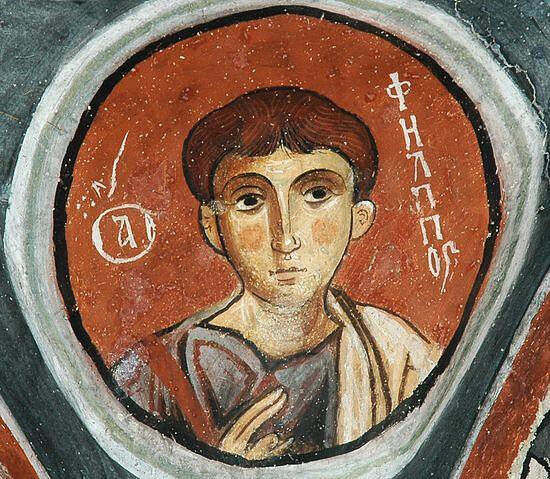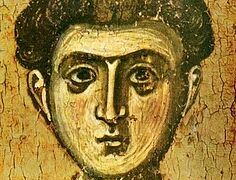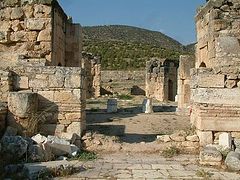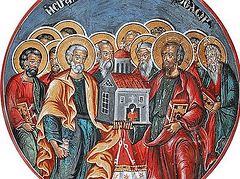The Holy Apostle Philip was born in the town of Bethsaida in Galilee. He was a great scholar of the Sacred Scriptures and, correctly understanding the meaning of the Old Testament prophecies, awaited the coming of the Messiah. Answering the Savior’s call (John 1:43), he followed after Him. The Holy Gospels mention the Apostle Philip several times: He brought the Apostle Nathanial to Christ (John 1:46); the Lord asked him how much money was needed to buy bread for 5,000 people (John 6:7); he brought to Christ Greeks who wanted to see Him (John 12: 21–22); finally, during the Last Supper, he asked Christ about God the Father (John 14:8).
After the Lord’s Ascension, Philip preached the Word of God in Galilee; his preaching was accompanied by the working of miracles. Thus, he resurrected a child who had died in its mother’s arms. From Galilee he went to Greece, and preached among the Jewish immigrants. After some of them told [the people of] Jerusalem about the Apostle’s preaching, a delegation of scribes, with the High Priest at their head, went to Greece to bring charges against Philip. The Apostle Philip denounced the High Priest’s lies to the effect that Christ’s disciples had stolen and hidden the Lord’s Body; he related how the Pharisees had bribed the guard to disseminate that rumor. The Jewish High Priest and his fellow travelers began to blaspheme against the Lord and attacked the Apostle Philip, but suddenly were struck blind. By the prayers of the Apostle, they all regained their sight, and witnessing such a miracle, many of them came to believe in Christ. The Apostle Philip appointed Narcissos, one of the Seventy Apostles, to be their bishop.In Greece, the Apostle Philip went to Parthia, and then to the town of Azota, where he healed the eyes of the daughter of Nikodemos, a local resident who took Philip into his home and later was baptized together with his entire family.
From Azota, the Apostle Philip went to Hierapolis in Syria, where, incited by the Pharisees, the Jews set fire to the home of Iros, the man who had taken the Apostle Philip in; they also sought to kill the Apostle. However, witnessing miracles wrought by the Apostle: the healing of the withered hand of Aristarchos, the city magistrate who had sought to strike the Apostle, as well as the Apostle’s resurrection of a dead youth, they repented; many accepted Holy Baptism. Appointing Iros bishop of Hierapolis, the Apostle went through Syria, Asia Minor, Lydda, and Mysia; everywhere he preached the Gospel and endured suffering. He and his sister Mariamna who accompanied him, endured stoning, being locked away in dungeons, and being driven away from settlements.
Then the Apostle came to Phrygia, to the city of Hierapolis of Phrygia, where there were many pagan temples, including a temple to serpents, where lived an enormous viper. Through the power of prayer, the Apostle Philip killed the viper and healed many people who had been bitten by snakes. Among those he healed was a convert to Christianity, the wife of the Anthipatas, governor of the city. Learning of this, Governor Anthipatas ordered that Philip, his sister, and the Apostle Bartholomew who accompanied them, be seized. Egged on by the priests of the temple of the viper, Anthipatas ordered that the Holy Apostles Philip and Bartholomew be crucified. It was then that an earthquake buried all of those at the court. Hanging on the cross near the temple of the viper, the Apostle Philip prayed that those who had crucified him be saved from the consequences of the earthquake. Witnessing what had happened, the people believed on Christ, and began to demand that the Apostles be taken down from the crosses. The Apostle Bartholomew was still alive when he was taken from the cross; on being given his freedom, he baptized all of those who had come to the Faith, and appointed a bishop for them.
The Apostle Philip, through whose prayers everyone except Anthipatas and the pagan priests remained alive, died on the cross.
His sister Mariamna buried his body, and together with the Apostle Bartholomew, went to preach the Gospel in Armenia, where the Apostle Bartholomew was crucified (commemorated June) 11; Mariamna continued to preach until her death in Likaonia (commemorated February 17).
Parish Life, November 2020
St. John the Baptist Russian Orthodox Church, Washington, DC




